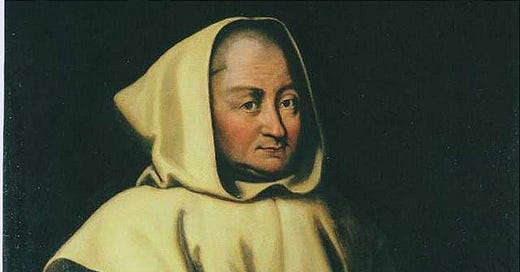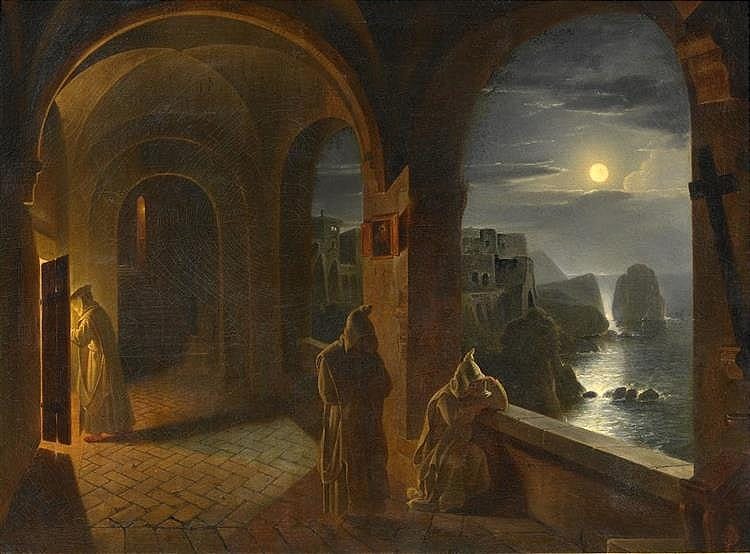Of the Love of Solitude and Silence
From 'An Introduction to the Interior and Perfect Life' by Dom Innocent Le Masson.
An Introduction to the Interior and Perfect Life was written by Dom Innocent Le Masson, a Carthusian and master of spirituality. The work is a compilation of texts and extracts from three sources: Introduction to the Devout Life, The Imitation of Christ, and Holy Scripture.
The Compilation was first written in French and published in 1677, and afterwards in Latin, that it might be useful to all Carthusians, and to others in every country. The following was taken from a 1902 publication, translated by Fr. Kenelm Digby Best.
Rev. Dom Innocent Le Masson was born at Noyon, on March 10, 1628. He became a Carthusian at age 19. He was a Religious of great piety and learning, and was chosen successively as Vicar, Prior, Visitor of the Province of Picardy, and lastly, the 49th General of the Order at the age of 47. He died happily on May 8, 1703, at the age of 75.
Chapter XX. Of the Love of Solitude and Silence
I. Seek a proper time to retire into thyself, and often think of the benefits of God.
Let curiosities alone.
Read such matters as may rather move thee to compunction than give thee occupation.
If thou wilt withdraw thyself from superfluous talk and idle visits, as also from giving ear to news and reports, thou wilt find times sufficient and proper to employ thyself in good meditations.
The greatest saints avoided the company of men as much as they could, and chose to live to God in secret.
II. “As often as I have been amongst men,” said Seneca, “I have returned less a man.” This we often experience when we talk long.
It is easier to be altogether silent than not to exceed in words.
It is easier to keep retired at home than to be able to be sufficiently upon one's guard abroad.
Whosoever, therefore, aims at arriving at internal and spiritual things, must, with Jesus, go aside from the crowd.
No man is secure in appearing abroad, but he who would willingly lie hid at home.
No man securely speaks, but he who loves to hold his peace.
No man securely governs, but he who would willingly live in subjection.
No man securely commands, but he who has learned well to obey.
III. No man securely rejoices unless he has within him the testimony of a good conscience.
Yet the security of the saints was always full of the fear of God.
Neither were they less careful or humble in themselves because they were shining with great virtues and graces.
But the security of the wicked arises from pride and presumption, and will end in deceiving themselves.
Never promise thyself security in this life, though thou seemest to be a good, religious man, or a devout hermit.
IV. Often times, they that were better in the judgment of men, have been in greater danger by reason of their too great confidence.
So that it is better for many not to be altogether free from temptations, but to be often assaulted, that they may not be too secure; lest, perhaps, they be lifted up with pride, or take more liberty to go aside after exterior comforts.
Oh! how good a conscience would that man preserve who would never seek after transitory joy, nor ever busy himself with the world.
Oh! how great peace and tranquility would he possess who would cut off all vain solicitude, and only think of the things of God and his salvation, and place his whole hope in God.
V. No man is worthy of heavenly comfort who has not diligently exercised himself in holy compunction.
If thou wouldst find compunction in thy heart, retire into thy chamber, and shut out the tumults of the world, as it is written: Have compunction in your chambers (Psalm 4:5).
Thou shalt find in thy cell what thou shalt often lose abroad.
Thy cell, if thou continue in it, grows sweet: but if thou keep not to it, it becomes tedious and distasteful.
If, in the beginning of thy conversion, thou accustom thyself to remain in thy cell, and keep it well, it will be to thee afterwards a dear friend, and a most agreeable delight.
VI. In silence and quiet the devout soul goes forward and learns the secrets of the Scriptures.
There she finds floods of tears with which she may wash and cleanse herself every night; that she may become so much the more familiar with her Maker, by how much the farther she lives from all worldly tumult.
For God, with his holy angels, will draw nigh to him who withdraws himself from his acquaintance and friends.
It is better to lie hid, and take care of one's self, than, neglecting one's self, to work even miracles.
It is commendable for a religious man to go seldom abroad, to fly being seen, and not to desire to see men.
VII. Why wilt thou see what thou must not have? The world passeth away and the concupiscence thereof (1 John 2:17).
The desires of sensuality draw thee abroad, but when the hour is past, what dost thou bring home but a weight upon thy conscience, and a dissipation of heart?
A joyful going abroad often brings forth a sorrowful coming home; and a merry evening makes a sad morning.
So all carnal joy enters pleasantly; but in the end brings remorse and death.
What canst thou see elsewhere, which thou seest not here? Behold the heaven and the earth, and all the elements; for of these are all things made.
VIII. What canst thou see anywhere which can continue long under the sun?
Thou thinkest, perhaps, to be satisfied, but thou canst not attain to it.
If thou couldst see all things at once before thee, what would it be but a vain sight?
Lift up thine eyes to God on high, and pray for thy sins and negligences.
Leave vain things to vain people; but mind thou the things which God has commanded thee.
Shut thy door upon thee, and call to thee Jesus thy beloved.
Stay with Him in thy cell, for thou shalt not find so great peace anywhere else.
If thou hadst not gone abroad, and hearkened to rumors, thou hadst kept thyself better in good peace; but since thou art delighted sometimes to hear news, thou must from thence suffer a disturbance of heart.









I linked your Substack in my post, concerning Teresa of Ávila. You follow through with "The Interior Castle" more depth than me. Ty.